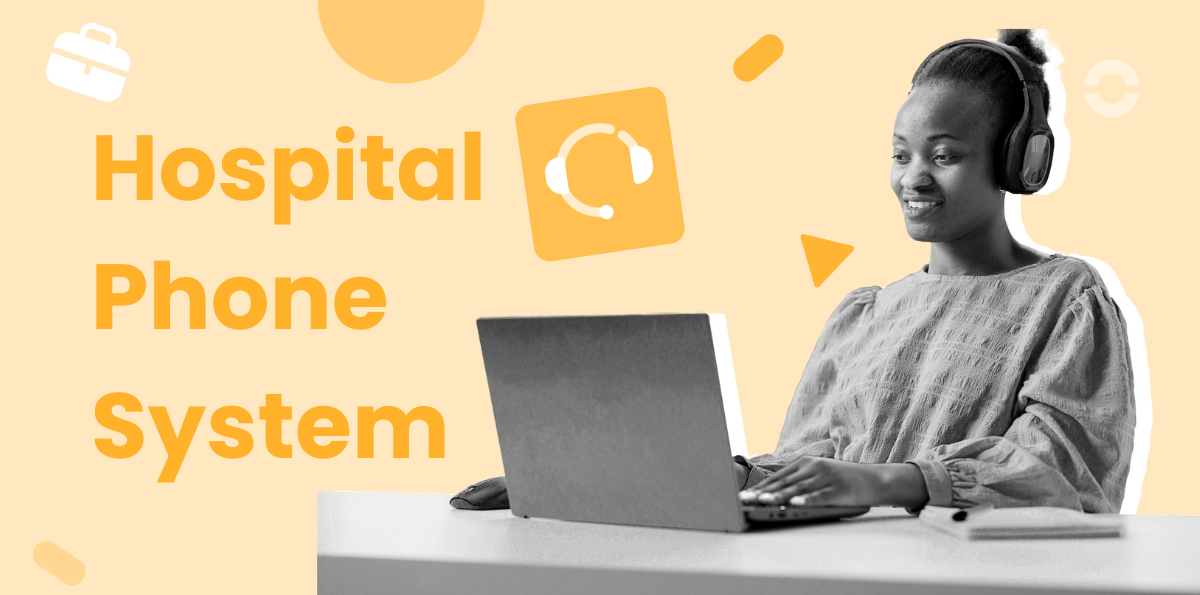Summary
A medical phone system transcends mere call making and receiving, evolving into an advanced tool aimed at boosting patient care, minimizing wait times, and enhancing the overall operational efficiency of healthcare services.
What Is a Hospital Phone System?
A hospital phone system is an advanced communication network tailored to the specific needs of healthcare settings. It transcends the basic functionality of making and receiving calls, emerging as an essential element for facilitating smooth communication between doctors, nurses, administrative staff, and patients alike.
With the shift from traditional desk phones to VoIP systems, hospitals now have access to cost-efficient, feature-rich calling solutions that promote better call management and teamwork.
At its essence, a hospital phone system fulfills several roles, including both internal and external communications. On the internal front, it enables seamless interaction among medical personnel, empowering doctors to send pages, nurses to inform patients about test results, and administrative staff to oversee daily operations effortlessly.
On the external side, it proficiently handles incoming calls from patients, their families, and other healthcare professionals, ensuring the effective transmission of vital information.
Considering the critical importance of confidentiality in healthcare, these systems are built to comply with stringent privacy and security regulations, such as HIPAA, to safeguard patient data. This is achieved through the implementation of features like call recording, secure voicemail, and encrypted communication pathways.
Beyond basic call functionalities, contemporary hospital phone systems often come equipped with sophisticated features like auto attendants, call queuing, and interactive voice response (IVR) systems. These advancements are designed to streamline call management, minimize wait times, and facilitate prompt connections to the appropriate individual or department.
The challenge lies in selecting the most suitable phone system from the myriad of options available. This article aims to demystify hospital phone systems by detailing their key features and benefits, thereby aiding healthcare organizations in making well-informed choices.
14 Best Hospital Phone Systems Table
| Software Name | Description | Key Features |
|---|---|---|
| Ringover | Ringover is a cloud-based VoIP phone system designed for healthcare organizations, offering advanced call management features | Interactive Voice Response (IVR), call forwarding, call queuing, HD voice quality, unlimited calls to 110+ destinations, Integrations including with CRMs |
| Nextiva | Nextiva is a business phone system that can be tailored for healthcare | Call groups, do not disturb |
| Grasshopper | Grasshopper is a VoIP system best-suited for small healthcare practices | Custom greetings, call forwarding |
| 8x8 | 8x8 provides a cloud phone system | HIPAA compliance, call recording |
| RingCentral | RingCentral offers a VoIP system | Auto-attendant, call flip |
| Vonage | Vonage is a cloud-based phone system that can be used for healthcare needs | Toll-free numbers, text messaging |
| Avaya | Avaya provides advanced communication solutions for healthcare, including robust call management and collaboration tools | Interactive Voice Response (IVR), messaging |
| Mitel | Mitel offers a range of communication solutions for healthcare, including cloud-based and on-premise phone systems with advanced features | Auto-attendant, mobile app |
| ShoreTel | ShoreTel provides unified communication solutions for healthcare, offering reliable and feature-rich phone systems | Call forwarding, call queuing |
| Microsoft Teams | Microsoft Teams is a collaboration platform that includes robust communication tools suitable for healthcare, integrating with other Microsoft services | Video conferencing, call recording |
| GoToConnect | GoToConnect is a cloud-based phone system designed for businesses, including healthcare, offering advanced call management and collaboration tools | Auto-attendant, call flow management |
| CallHippo | CallHippo is a VoIP phone system tailored for small to medium-sized healthcare practices, offering flexible and affordable communication solutions | Custom greetings, call forwarding |
| Phone.com | Phone.com provides a cloud-based phone system with features suitable for healthcare, including advanced call management and integration capabilities | Auto-attendant, call queuing |
| FreedomVoice | FreedomVoice offers a cloud-based phone system designed for businesses, including healthcare, providing robust communication tools and integrations | Voicemail, call transcription |
| Intermedia | Intermedia provides unified communication solutions for healthcare, offering reliable and feature-rich phone systems with advanced call management | Auto-attendant,, voicemail to email |
List: Top 14 Hospital Phone Systems
1. Ringover

Ringover is a cloud-based communications platform that offers VoIP software designed to meet the needs of healthcare organizations. It offers advanced call management features, high-quality audio, and seamless integration with other business tools.
Ringover is particularly useful for hospitals due to its ability to handle high call volumes and provide reliable communication solutions.
Advantages✅
- Interactive Voice Response (IVR): Automatically routes calls to the appropriate department or staff member.
- Unlimited Calls: Offers unlimited calls to over 110 destinations, reducing communication costs.
- Mobile and Desktop Apps: Allows staff to make and receive calls from anywhere, enhancing mobility and flexibility.
Disadvantages❌
- Dependence on Internet: Requires a stable internet connection to function, which can be a concern in areas with poor connectivity.
2. Nextiva
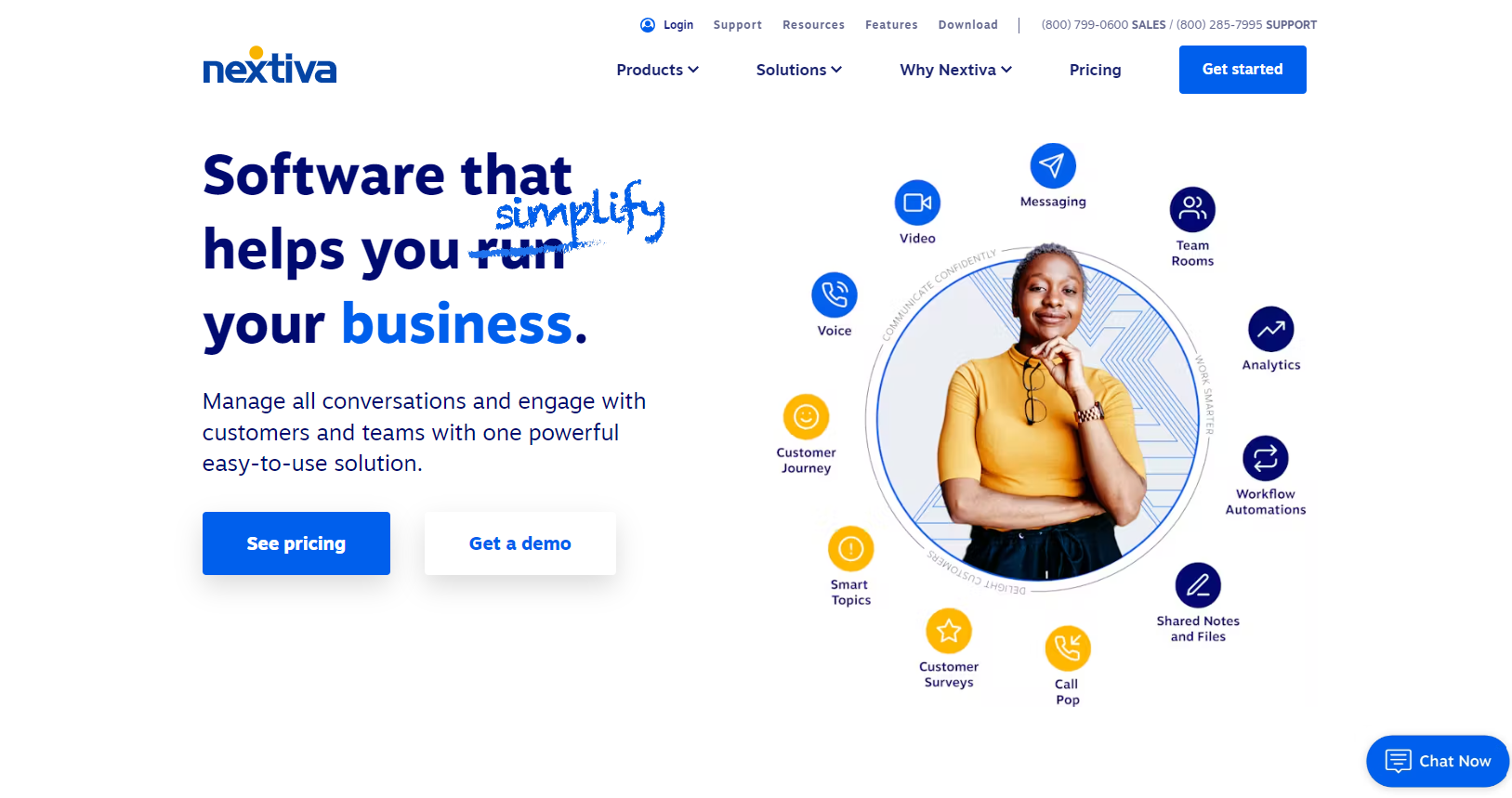
Nextiva is a comprehensive business phone system that can be tailored to meet the specific needs of healthcare organizations. It provides robust communication tools, including auto-attendants, call recording, and video conferencing. Nextiva's system is known for its ease of use and integration capabilities with CRM systems.
Advantages✅
- Auto-Attendant: Automatically greets and directs callers, reducing the workload on staff.
- CRM Integrations: Seamlessly integrates with CRM systems, enhancing patient data management.
- Video Conferencing: Facilitates remote meetings and consultations, improving collaboration and patient care.
Disadvantages❌
- Complex Setup: Can be complex to set up, especially for smaller healthcare practices.
- Costly Add-ons: Some advanced features may require additional costs.
- Customer Support: Some users have reported mixed experiences with customer support.
3. Grasshopper
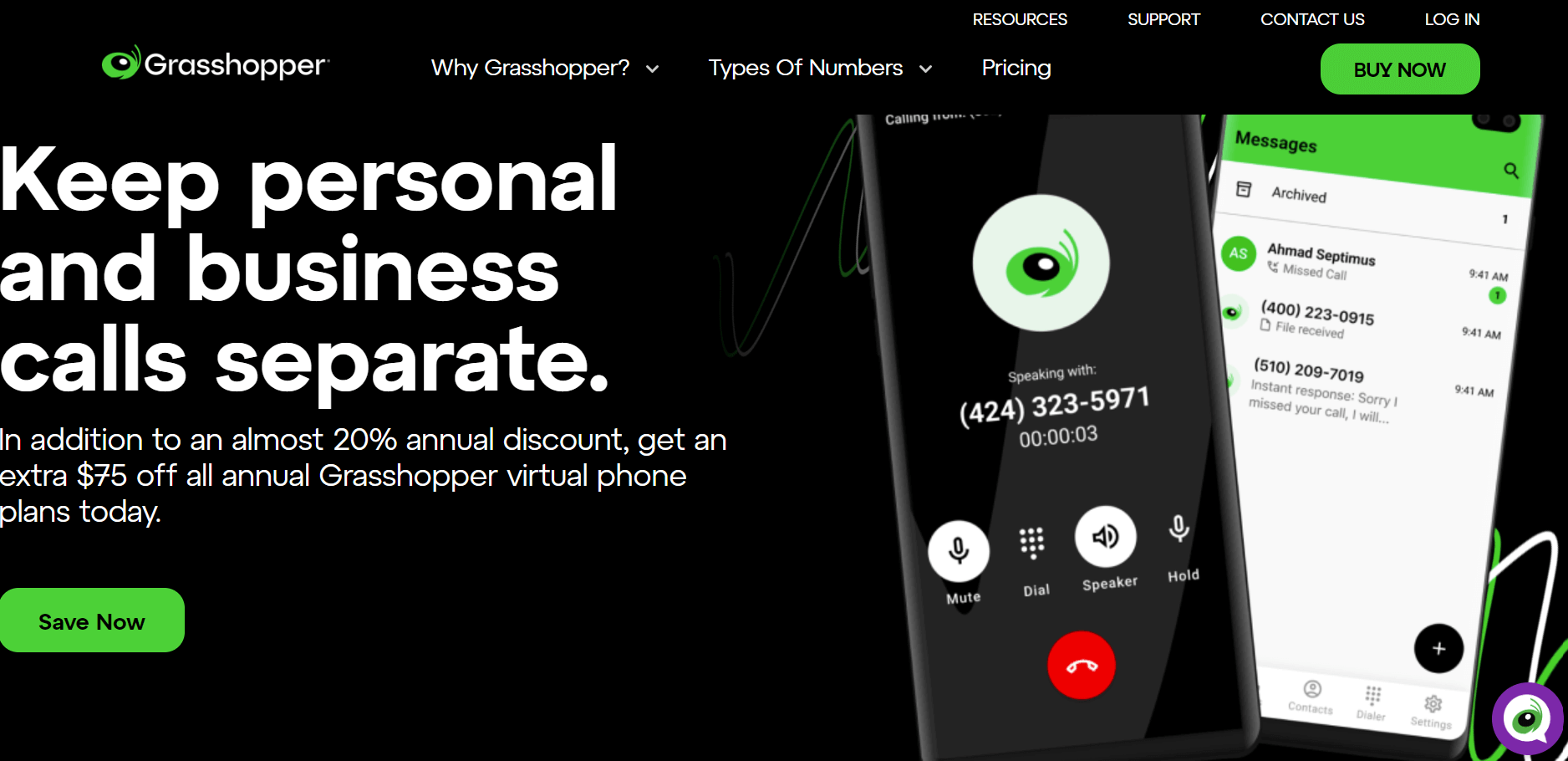
Grasshopper is a user-friendly VoIP system suitable for small healthcare practices. It offers flexible call management options, including custom greetings and voicemail transcription. Grasshopper is known for its simplicity, but its limited functionalities can mean it's not sufficient for the needs of certain businesses.
Advantages✅
- Ease of Use: Simple to set up and use, even for those without technical expertise.
- Affordable: Offers competitive pricing plans, making it a cost-effective option.
- Mobile App: Allows staff to make and receive calls from their mobile devices.
Disadvantages❌
- Limited Features: May lack some of the advanced features available in other systems.
- Limited Scalability: Not ideal for large healthcare organizations with high call volumes.
- Customer Support: Some users have reported limitations in customer support options when it's used as a contact center software.
4. 8x8

8x8 provides a cloud phone system with advanced features like secure and compliant call handling, adhering to HIPAA standards. 8x8's system includes call recording, analytics dashboards, and video conferencing.
Advantages✅
- HIPAA Compliance: Ensures that all communications are secure and compliant with healthcare regulations.
- Advanced Analytics: Provides detailed analytics and reporting, helping in resource planning and performance evaluation.
- Video Conferencing: Facilitates remote meetings and consultations, enhancing collaboration and patient care.
Disadvantages❌
- Complex Interface: The system can be complex to navigate, especially for new users.
- Cost: Can be more expensive than some other VoIP solutions.
- Dependence on Internet: Requires a stable internet connection to function.
5. RingCentral
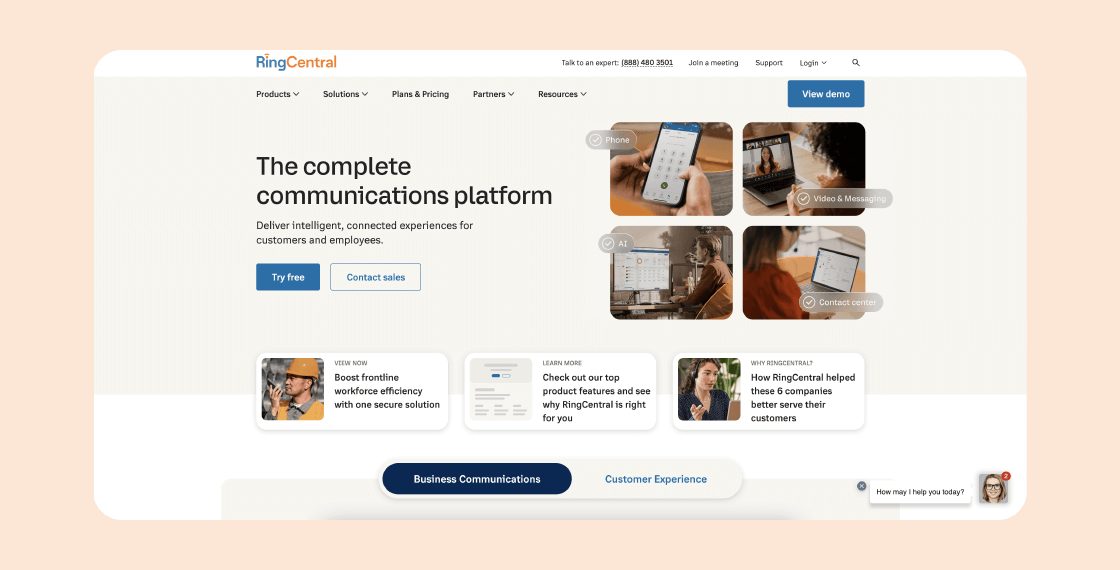
RingCentral offers a robust IP phone system with features tailored for healthcare, including advanced call management and integration capabilities. It provides auto-attendants, call queuing, and video conferencing.
Advantages✅
- Advanced Call Management: Includes features like auto-attendants and call queuing, enhancing call handling efficiency.
- Integration Capabilities: Seamlessly integrates with CRM systems and other business tools.
- Video Conferencing: Facilitates remote meetings and consultations, improving collaboration and patient care.
Disadvantages❌
- Cost: Can be more expensive than some other VoIP solutions.
- Complex Setup: May require technical expertise for initial setup and configuration.
- Customer Support: Some users have reported mixed experiences with customer support.
6. Vonage
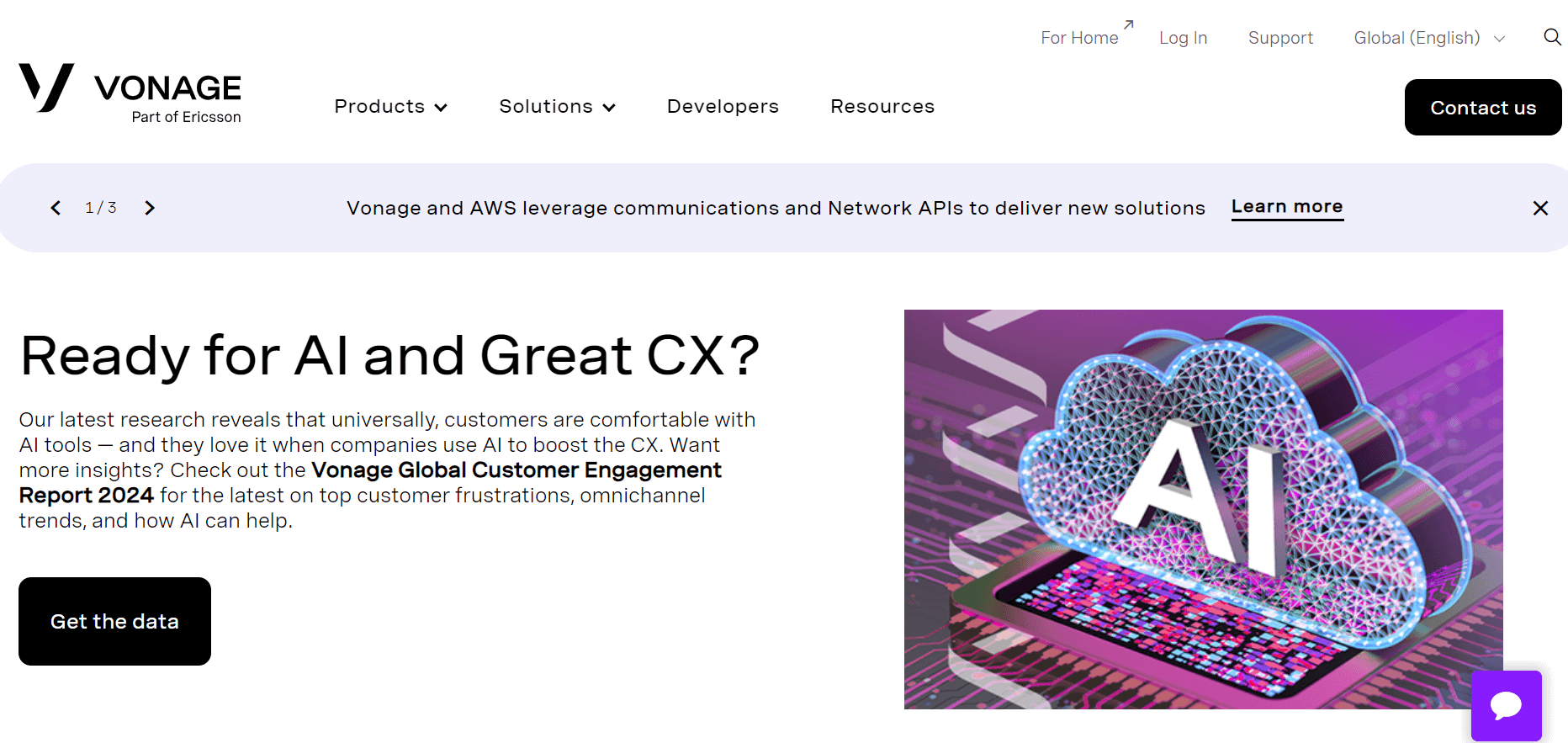
Vonage is a cloud-based phone system that can be customized for healthcare needs, offering reliable and feature-rich communication solutions. It includes call forwarding, call recording, and voicemail transcription, making it a solid choice for healthcare organizations.
Advantages✅
- Customization: Can be tailored to meet the specific needs of healthcare organizations.
- Reliable: Offers reliable communication solutions with minimal downtime.
- Mobile App: Allows staff to make and receive calls from their mobile devices.
Disadvantages❌
- Cost: Can be more expensive than some other VoIP solutions.
- Limited Advanced Features: May lack some of the advanced features available in other systems.
- Customer Support: Some users have reported limitations in customer support options.
7. Avaya

Avaya provides advanced communication solutions for healthcare, including robust call management and collaboration tools. It offers on-premise, hybrid, and cloud-based solutions, making it flexible for different healthcare settings.
Advantages✅
- Flexibility: Offers on-premise, hybrid, and cloud-based solutions, catering to different healthcare needs.
- Advanced Features: Includes features like interactive voice response (IVR) and call queuing.
- Scalability: Can support up to 50,000 users, making it suitable for large healthcare organizations.
Disadvantages❌
- Complex Setup: Can be complex to set up, especially for smaller healthcare practices.
- Cost: Can be more expensive than some other VoIP solutions.
- Dependence on Internet: Requires a stable internet connection for cloud-based solutions.
8. Mitel
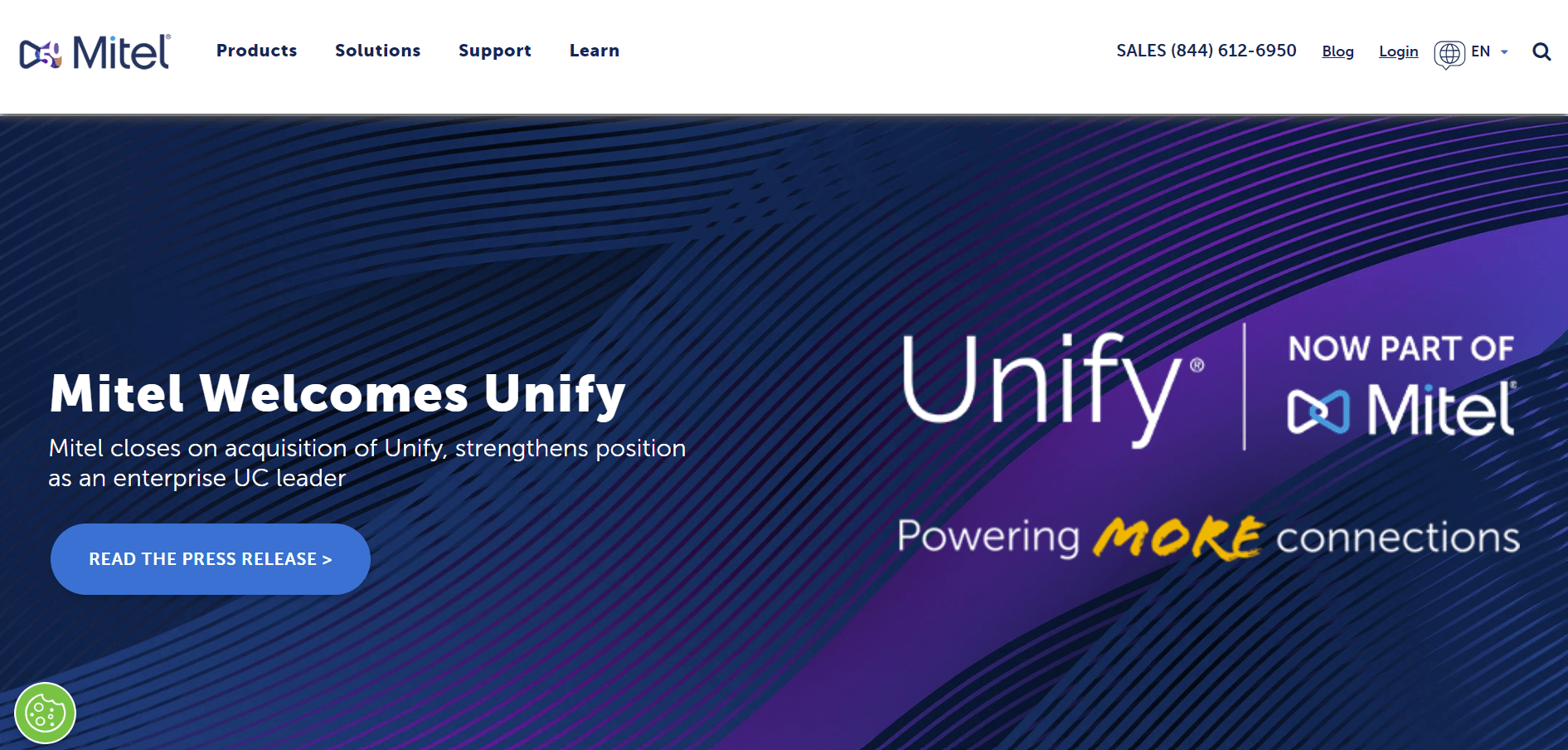
Mitel offers a range of communication solutions for healthcare, including cloud-based and on-premise phone systems with advanced features. It provides auto-attendants, call recording, and video conferencing, making it a reliable choice for healthcare organizations.
Advantages✅
- Advanced Features: Includes features like auto-attendants and call recording.
- Flexibility: Offers both cloud-based and on-premise solutions.
- Scalability: Suitable for healthcare organizations of all sizes.
Disadvantages❌
- Complex Interface: The system can be complex to navigate, especially for new users.
- Cost: Can be more expensive than some other VoIP solutions.
- Customer Support: Some users have reported mixed experiences with customer support.
9. ShoreTel
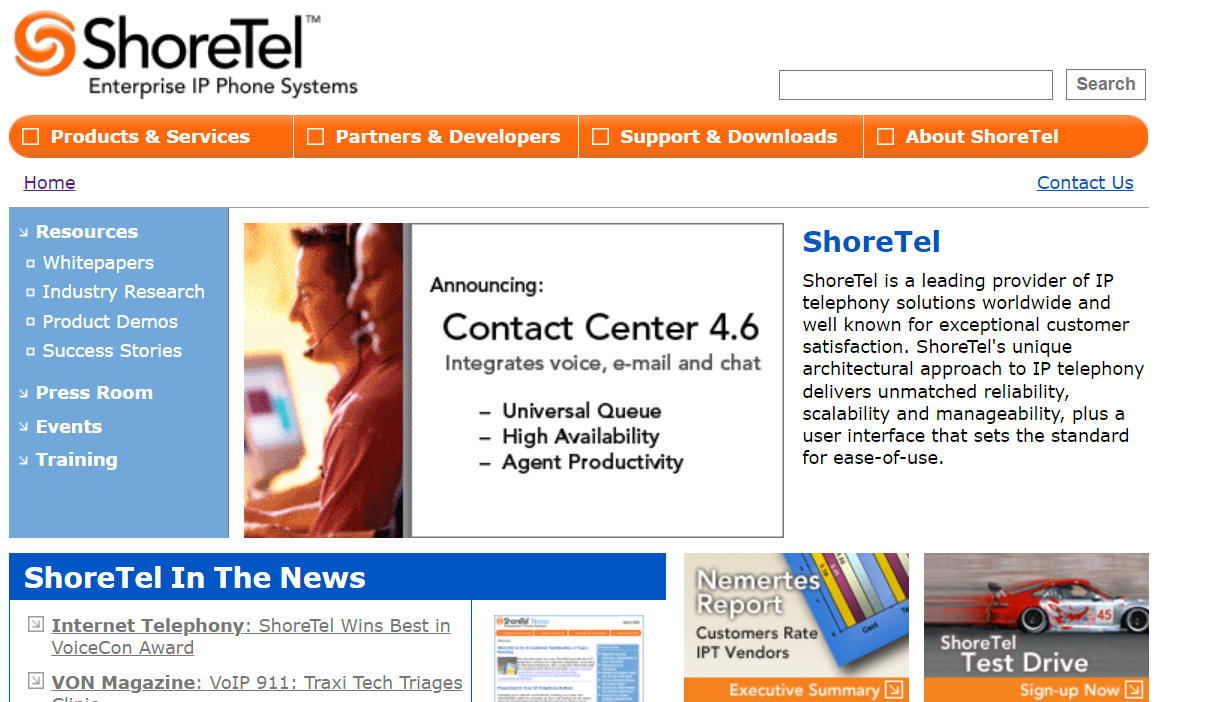
ShoreTel provides unified communication solutions for healthcare, offering reliable and feature-rich phone systems. It includes call forwarding, call queuing, and voicemail transcription, making it a solid choice for healthcare organizations.
Advantages✅
- Reliability: Offers reliable communication solutions with minimal downtime.
- Ease of Use: Simple to set up and use, even for those without technical expertise.
- Integration Capabilities: Seamlessly integrates with other business tools.
Disadvantages❌
- Limited Advanced Features: May lack some of the advanced features available in other systems.
- Cost: Can be more expensive than some other VoIP solutions.
- Customer Support: Some users have reported limitations in customer support options.
10. Microsoft Teams
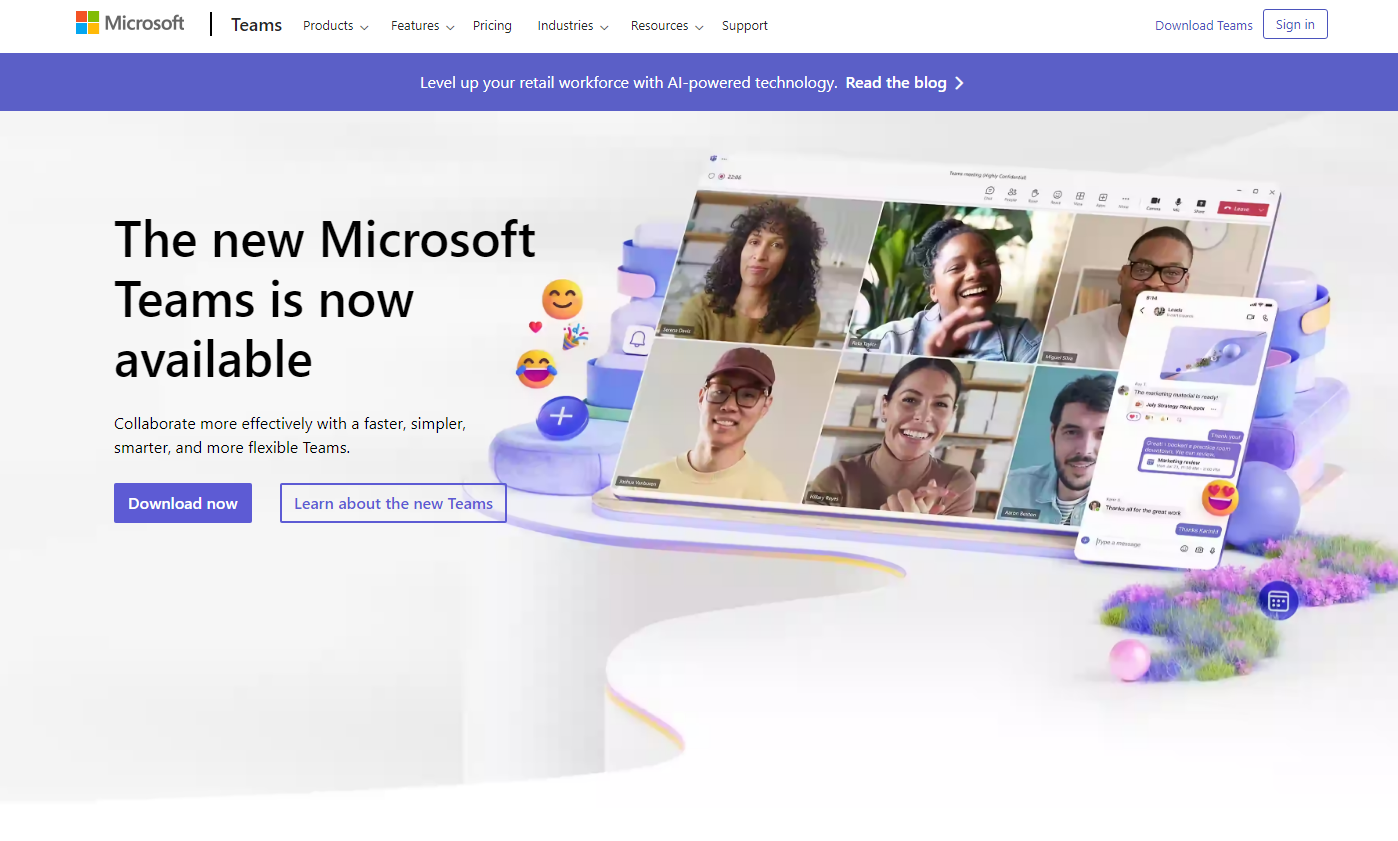
Microsoft Teams is a collaboration platform that includes robust communication tools suitable for healthcare. It integrates with other Microsoft services, providing video conferencing, call recording, and voicemail transcription.
Advantages✅
- Integration Capabilities: Seamlessly integrates with other Microsoft services.
- Video Conferencing: Facilitates remote meetings and consultations, improving collaboration and patient care.
- Ease of Use: Simple to use, especially for those already familiar with Microsoft products.
Disadvantages❌
- Dependence on Microsoft Ecosystem: Requires users to be part of the Microsoft ecosystem.
- Cost: Can be more expensive than some other VoIP solutions.
- Complex Setup: May require technical expertise for initial setup and configuration.
11. GoToConnect
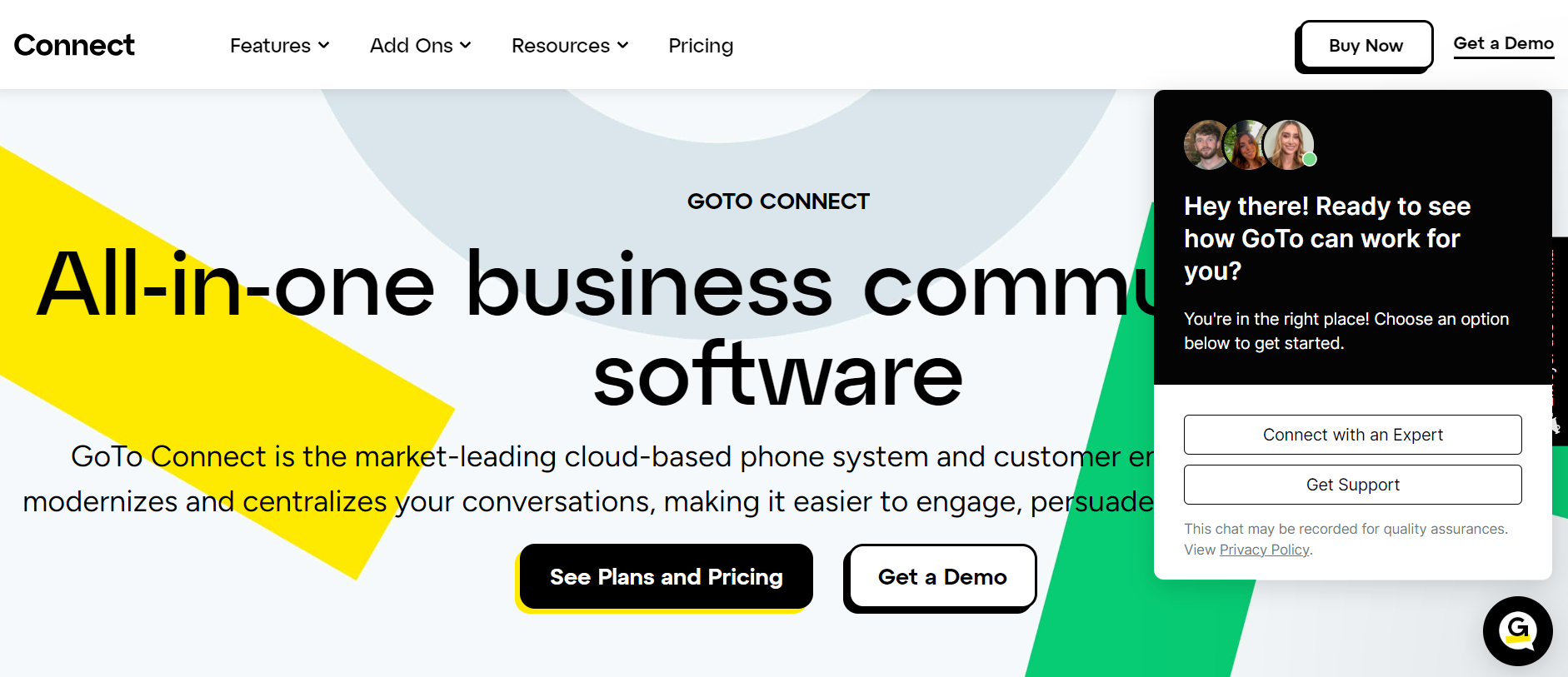
GoToConnect is a cloud-based phone system designed for businesses, including healthcare, offering advanced call management and collaboration tools. It includes auto-attendants, call queuing, and video conferencing.
Advantages✅
- Advanced Call Management: Includes features like auto-attendants and call queuing.
- Integration Capabilities: Seamlessly integrates with other business tools.
- Video Conferencing: Facilitates remote meetings and consultations, improving collaboration and patient care.
Disadvantages❌
- Cost: Can be more expensive than some other VoIP solutions.
- Complex Setup: May require technical expertise for initial setup and configuration.
- Customer Support: Some users have reported mixed experiences with customer support.
12. CallHippo
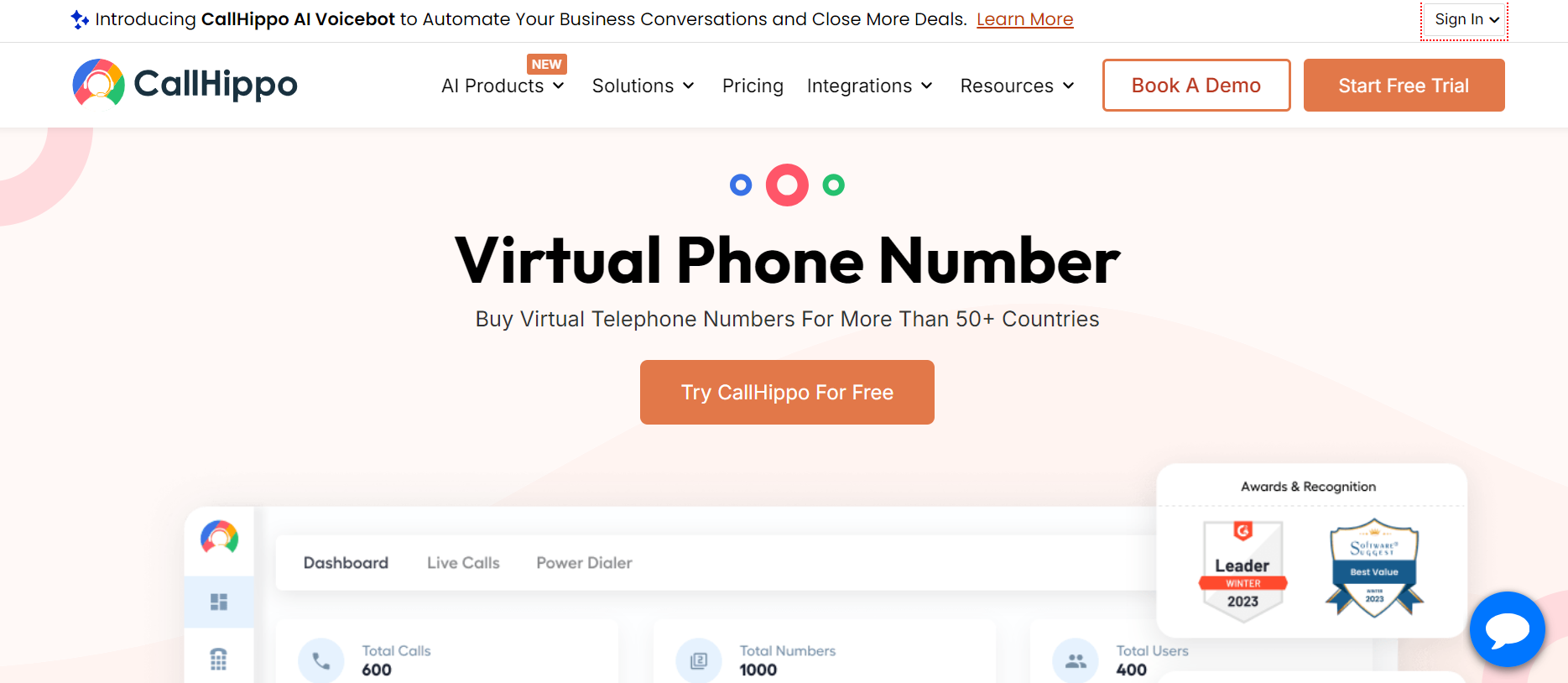
CallHippo is a VoIP phone system tailored for small to medium-sized healthcare practices, offering flexible and affordable communication solutions. It includes custom greetings, call forwarding, and voicemail transcription.
Advantages✅
- Ease of Use: Simple to set up and use, even for those without technical expertise.
- Affordable: Offers competitive pricing plans, making it a cost-effective option.
- Mobile App: Allows staff to make and receive calls from their mobile devices.
Disadvantages❌
- Limited Features: May lack some of the advanced features available in other systems.
- Limited Scalability: Not ideal for large healthcare organizations with high call volumes.
- Customer Support: Some users have reported limitations in customer support options.
13. Phone.com

Phone.com provides a cloud-based phone system with features suitable for healthcare, including advanced call management and integration capabilities. It offers auto-attendants, call queuing, and video conferencing.
Advantages✅
- Advanced Call Management: Includes features like auto-attendants and call queuing.
- Integration Capabilities: Seamlessly integrates with other business tools.
- Video Conferencing: Facilitates remote meetings and consultations, improving collaboration and patient care.
Disadvantages❌
- Cost: Can be more expensive than some other VoIP solutions.
- Complex Setup: May require technical expertise for initial setup and configuration.
- Customer Support: Some users have reported mixed experiences with customer support.
14. FreedomVoice
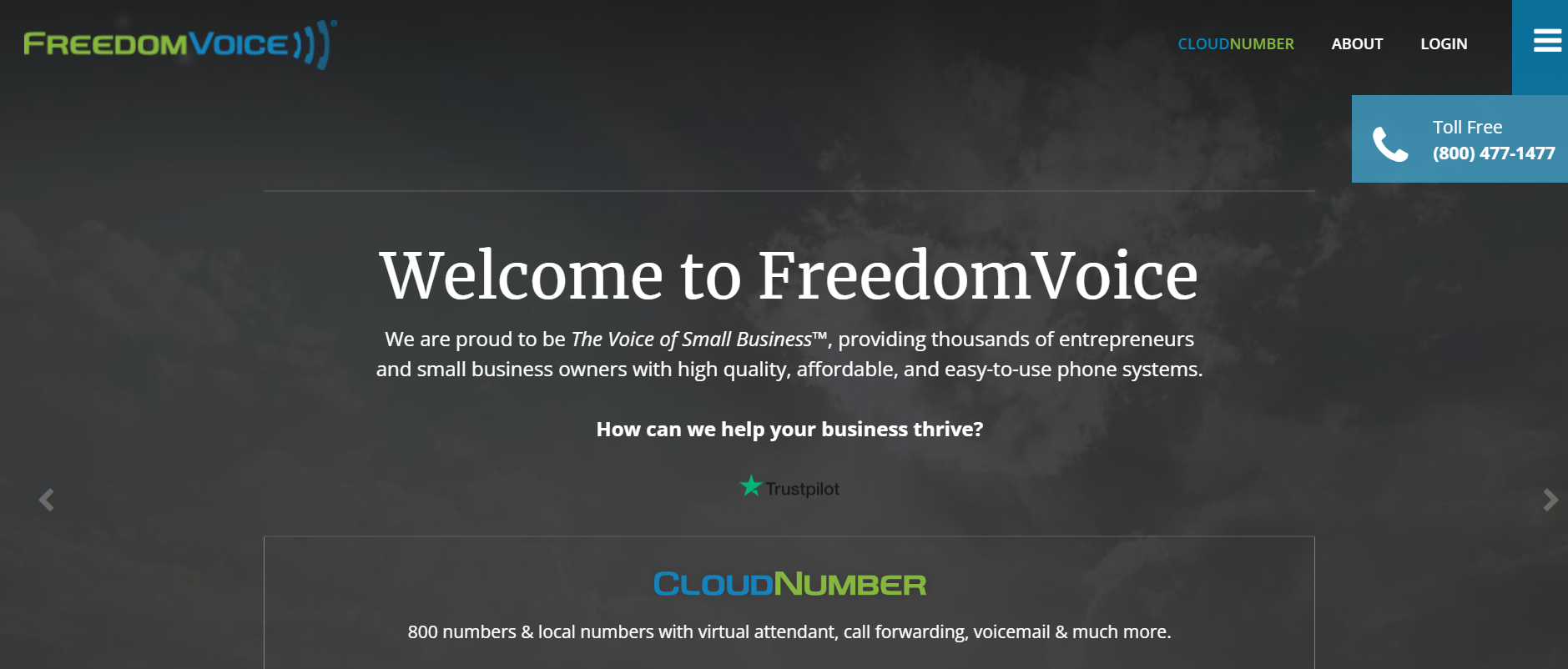
FreedomVoice offers a cloud-based phone system designed for businesses, including healthcare, providing robust communication tools and integrations. It includes call forwarding, call recording, and voicemail transcription.
Advantages✅
- Reliability: Offers reliable communication solutions with minimal downtime.
- Ease of Use: Simple to set up and use, even for those without technical expertise.
- Integration Capabilities: Seamlessly integrates with other business tools.
Disadvantages❌
- Limited Advanced Features: May lack some of the advanced features available in other systems.
- Cost: Can be more expensive than some other VoIP solutions.
- Customer Support: Some users have reported limitations in customer support options.
6 Use Cases for a Hospital Phone System
1. Scheduling Appointments
The facilitation of appointment scheduling is a prime function of a hospital phone system. Leveraging a medical phone system can augment this process by integrating with patient portals, enabling scheduling through webchat or automated phone systems. This innovation not only alleviates the workload on reception staff but also ensures efficient patient routing to the appropriate departments.
2. Appointment Reminders
Utilizing automated reminders is essential in minimizing missed appointments and enhancing patient engagement. Hospital phone systems can dispatch reminders through calls, texts, or , covering a wide range of omnichannel communication channels. This capability significantly reduces missed appointments, optimizes staffing, and boosts patient revenues.
3. Sharing Information Across Multidisciplinary Care Teams
Optimal patient care necessitates seamless communication among the healthcare team. Hospital phone systems enable instant communication and collaboration among nurses, doctors, and other medical staff. Secure messaging, video conferencing, and EHR integration ensure that every team member is up-to-date with the latest patient information.
4. Telehealth and Remote Consultations
In the era of remote patient care, telehealth has surged in importance. Hospital phone systems support HIPAA-compliant video conferencing, facilitating virtual consultations and continuous patient care. This is especially beneficial for follow-up visits and remote monitoring of patient conditions.
5. Automated Self-Service and Patient Engagement
Interactive voice response (IVR) systems within a hospital phone system offer automated self-service options for patients, including bill payments, prescription refills, and access to diagnostics. These automated services not only boost patient engagement but also significantly reduce hospital staff workload.
6. Emergency Response and Crisis Management
In emergencies, the efficacy of a phone system is paramount for swift and effective communication. Hospital phone systems are designed to manage emergency calls efficiently, featuring call routing and priority queuing. These functionalities ensure rapid and accurate transmission of critical information during high-stress scenarios.
A VoIP software provides insights into how many calls your organization handles, so you can optimize your staffing to handle times of high call volume.
Features of a Hospital Phone System
A hospital phone system comes packed with numerous features aimed at enhancing communication, improving patient care, and making hospital operations more efficient. Below are some of the critical features necessary for a hospital phone system to be effective:
Reliability and Accessibility
In a healthcare environment where effective communication is paramount, a reliable phone system is essential. It must guarantee minimal downtime and be accessible to all staff members at any time, including doctors, nurses, administrative staff, and emergency response teams.
Advanced Call Management Features
Features such as auto-attendants, call queuing, and call forwarding are essential for efficiently managing high call volumes. These tools ensure calls are quickly directed to the appropriate department or staff member, thereby reducing wait times and enhancing patient satisfaction.
Integration with Hospital Systems
An ideal hospital phone system should integrate flawlessly with existing hospital management software and electronic health records (EHR). This integration enables staff to access patient information promptly, improving the speed and accuracy of patient care.
Scalability
The system must be scalable, ready to accommodate the hospital's expanding needs. As the hospital grows, the phone system should easily adapt, managing increased call volumes and additional departments or services without losing efficiency.
Ease of Use
With often limited time to learn new technologies, a user-friendly interface is essential for hospital staff. The system should be straightforward, requiring minimal training and thus reducing the workload on healthcare workers.
Security and Compliance
Adhering to data protection and privacy regulations, such as HIPAA in the US and PIPEDA in Canada, is a must. The system should include secure user authentication, data encryption, and regular audits to safeguard patient information.
Advanced Messaging Capabilities
Efficient communication among hospital staff and other healthcare providers is facilitated by features like conference bridges, group paging, find me/follow me, and hunt groups. These are particularly beneficial for remote consultations and emergency scenarios.
Call Recording and Analytics
Call recording is useful for evaluating agent skills and performance, identifying areas for improvement, and ensuring quality of service. Analytics offer valuable data-driven insights that assist in strategic planning and enhancing operational efficiency.
Video Conferencing and Telehealth
Video conferencing capabilities are essential for supporting telehealth services, allowing for remote consultations and enhancing patient engagement. This feature is invaluable for follow-up appointments and remote patient monitoring.
Hold Music and Self-Service Options
Hold music and automated self-service options can improve the patient experience by reducing wait times and offering immediate assistance. These features also aid in managing high call volumes more effectively.
Support and Maintenance
Access to reliable technical support and maintenance services is critical for promptly addressing any issues with the phone system, ensuring minimal disruption in hospital communications. Having skilled technicians who are familiar with the unique requirements of a hospital setting is indispensable.
Hospital Phone System FAQ
What phone systems do hospitals use?
Hospitals primarily employ Voice over Internet Protocol (VoIP) phone systems for their advanced features, cost-effectiveness, and enhanced communication efficiency. Depending on the hospital's specific requirements, these systems can be implemented as cloud-hosted, on-premise, or hybrid solutions.
What is the hospital policy on cell phones?
Hospital cell phone policies are designed to strike a balance between personal communication needs and the imperative to uphold patient confidentiality while minimizing distractions. Typically, these policies limit the use of personal cell phones in patient care areas to avoid interruptions and adhere to privacy regulations like HIPAA.
Are hospital phone lines recorded?
Yes, many hospital phone lines, especially those that handle patient information, are recorded. This practice supports quality control, patient care improvement, and compliance with regulatory standards. Recording calls is a standard feature in hospital phone systems for monitoring and assessing communication.
What is a HIPAA-compliant phone system?
A HIPAA-compliant phone system is engineered to secure patient health information (PHI) in line with the Health Insurance Portability and Accountability Act (HIPAA) guidelines. These systems feature data encryption, secure user authentication, and regular audits to protect patient information.
What software system do most hospitals use?
While hospitals utilize various software systems, for phone systems, they frequently choose VoIP solutions from providers such as RingCentral, 8x8, Mitel, and Avaya. These systems are preferred for their sophisticated call management, integration capabilities, and compliance with healthcare regulations.
Can you make phone calls in a hospital?
Phone calls can be made in hospitals, but restrictions may apply based on the institution's policy. Patients and visitors are usually allowed to use their personal cell phones in specified areas, whereas hospital staff rely on the hospital's phone system for official communications. Nonetheless, making calls in patient care zones is often restricted to preserve a tranquil and focused atmosphere.
Published on September 16, 2024.
